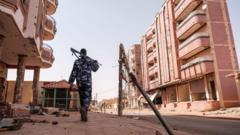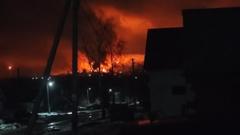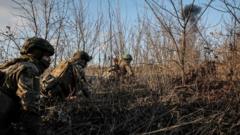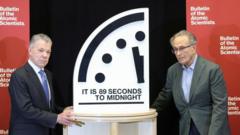In a decisive shift in Syrian leadership, Ahmed al-Sharaa has officially been named president for the "transitional period" after successfully leading the rebellion that culminated in the removal of Bashar al-Assad. This announcement comes from state media seven weeks post-rebellion. Rebel military commander Hassan Abdul Ghani declared the cancellation of the 2012 constitution and the disbandment of the remnants of Assad’s regime, including parliament, military, and security agencies.
Ahmed al-Sharaa Assumes Transitional Presidency in Post-Assad Syria
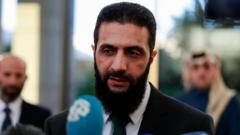
Ahmed al-Sharaa Assumes Transitional Presidency in Post-Assad Syria
Syria embarks on a new political chapter as Ahmed al-Sharaa takes the helm as transitional president following the ousting of Bashar al-Assad.
Al-Sharaa’s presidency involves forming an interim legislative council to steer the country towards a new constitution. Integral to this transition is the dissolution of existing rebel factions, which will be integrated into government structures. According to rebel leaders, new elections may anticipate a lengthy timeline, possibly extending up to four years.
The pivotal announcements unfolded during a meeting in Damascus with military leaders who once allied against Assad, primarily from the Islamist group Hayat Tahrir al-Sham (HTS), which was previously aligned with al-Qaeda and is still classified as a terrorist organization by multiple international bodies. The civil war, instigated by Assad's harsh response to pro-democracy protests in 2011, has led to significant devastation, claiming over 500,000 lives and displacing around 12 million people.
On December 8, the resignation of Assad followed the rapid progression of rebel forces into Damascus after a swift campaign. An interim governance structure, commanded by Mohammed al-Bashir, has begun the administration of the nation until March.
In light of these developments, the Syrian government engaged in discussions with Russia's Deputy Foreign Minister Mikhail Bogdanov about addressing "past mistakes," including proposals for war reparations and fostering reconstruction efforts. Russia, which previously maintained a military presence in Syria, has begun withdrawing troops while cautiously preserving its strategic bases along the Mediterranean coast.
Kremlin spokesperson Dmitry Peskov reiterated Russia’s support for maintaining dialogue with Syria while addressing queries regarding war reparations and requested extraditions. Al-Sharaa has emphasized the importance of Russia's ongoing relationship with Syria, marking this transition as a critical juncture for the war-torn nation.
The pivotal announcements unfolded during a meeting in Damascus with military leaders who once allied against Assad, primarily from the Islamist group Hayat Tahrir al-Sham (HTS), which was previously aligned with al-Qaeda and is still classified as a terrorist organization by multiple international bodies. The civil war, instigated by Assad's harsh response to pro-democracy protests in 2011, has led to significant devastation, claiming over 500,000 lives and displacing around 12 million people.
On December 8, the resignation of Assad followed the rapid progression of rebel forces into Damascus after a swift campaign. An interim governance structure, commanded by Mohammed al-Bashir, has begun the administration of the nation until March.
In light of these developments, the Syrian government engaged in discussions with Russia's Deputy Foreign Minister Mikhail Bogdanov about addressing "past mistakes," including proposals for war reparations and fostering reconstruction efforts. Russia, which previously maintained a military presence in Syria, has begun withdrawing troops while cautiously preserving its strategic bases along the Mediterranean coast.
Kremlin spokesperson Dmitry Peskov reiterated Russia’s support for maintaining dialogue with Syria while addressing queries regarding war reparations and requested extraditions. Al-Sharaa has emphasized the importance of Russia's ongoing relationship with Syria, marking this transition as a critical juncture for the war-torn nation.

